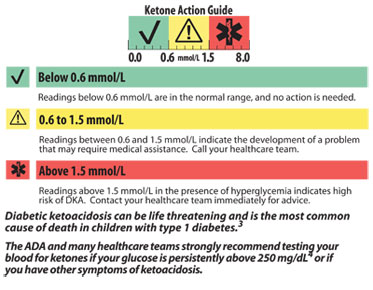What are ketones?
Ketones appear in the blood when there is not enough insulin in the body to change sugar into energy. When the body cannot use sugar, it uses fat and muscle stores for energy. The breakdown of the fat and muscle produces ketones. Ketones are an acid waste product that build up in the blood. This can happen when there is too little insulin in the body due to not taking enough insulin or illness. It can also happen when there is not enough food due to weight loss or skipping meals. Because ketones are an acid, they can upset the way the body functions. This can lead to a serious condition. It is called diabetic ketoacidosis (DKA). It is a dangerous situation. Be aware it is more common in type 1 diabetes.
How to check for ketones
For many years checking urine for ketones was the common method. But now you can check your blood for ketones, instead. This is done the same way as checking your blood sugar. It is important to note, that not all meters check for blood ketones. Nova Max® Plus does check for both glucose and ketone levels with the same meter. You just need to use a different strip for ketones.
Advantages of testing for blood ketones over urine ketones
Testing your blood for ketones will give you an earlier warning because ketones show up in the blood earlier than in urine. This is helpful because sometimes you cannot give a urine sample because you are dehydrated. Dehydration is a common symptom of a high ketone level. By knowing the blood ketone level earlier, you can treat your symptoms. This may help you to stay out of the hospital. Keep some individually wrapped blood ketone strips in your meter case at all times.

The ADA recommends that ketone testing should be performed on sick days and whenever glucose is consistently high. The ADA also states that blood ketone testing is preferred over urine ketone testing.
Who should check for blood ketones
- Children and teenagers with Type 1 diabetes
- Insulin pump users
- Pregnant women with diabetes
- All people with insulin dependent diabetes
When to check for blood ketones
- Blood sugar over 240mg/dL
- Illness
- Stress
- Pregnancy
Warning signs of diabetic ketoacidosis (DKA)
- High blood sugar
- Nausea and/or vomiting
- Fruity acidic breath
- Rapid, labored breathing
- Stomach pain or cramping
- Blood ketone level above 1.5 mmol/L
Diabetic ketoacidosis can lead to:
- Fatigue
- Confusion
- Coma
American Diabetes Association, Tests of Glycemia in Diabetes, Diabetes Care, 2004;27(S1):S91-93.
